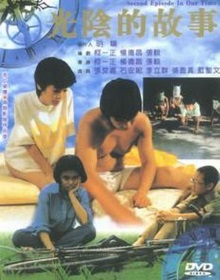
This is an older Taiwanese anthology film from our usual cinephile friend. As a collection of four short films, each made by a different director and cast of performers, it would be pretty unremarkable, except that one of the directors is Edward Yang and a couple of the stories feature highly recognizable stars, a very young Sylvia Chang and child actress Shi An Ni.
There is a little to connect the four stories save that they are about characters of roughly ascending age. The first one is about a small boy who is bullied both at school and at home by parents who blatant favor his brother. His only form of escape is a fantasy featuring his favorite toy dinosaur. The next story is about an adolescent girl becoming sexually aware of her own body when her mother takes in a good looking male college student as a tenant. The Then there’s a story about a college-age youth about grit and determination, ending with a lighter tale of a young working married couple who experiences the worst morning ever. While the preceding three stories can be said to deal in some way with growing up, the last short film breaks this pattern, being mostly a comedy of errors. Unfortunately for this anthology, it is also the most entertaining of the lot.
The Wikipedia entry for this film describes it as being foundational of what is known as New Taiwan Cinema. I suppose that it’s true is the sense that you can see the essential elements of the style present in a nascent form here. Unfortunately this also feels very much like a student film in that the directors are visibly feeling their way and still in the process of learning what works. The child actors deliver visibly stiff performances and the directors aren’t able to cover for their weaknesses. Worst of all is that the storytelling is too traditional with every story beat being well telegraphed in advance and every character filling a standard archetype. It may have been interesting in its time for its willingness to bring adult themes to the cinema but there’s no subtlety here at all and the treatment of each character is too obvious. Even the musical cues are too blunt. The third story for example is called Leapfrog and its frequent cuts to images of the main character’s pet frog with how it is meant to represent rising to success against the odds is trite and even downright cringey.
There’s some nostalgia value in how this collection faithfully captures the Taiwan of the 1980s, not only in its sights and sounds, but the spirit of the times and the moral attitudes of the people. Unfortunately that’s still not enough to make this worth your time. Completionists might find this interesting but it’s perfectly skippable to everyone else.